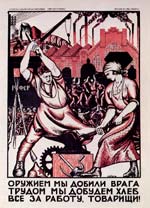
"Chaos Instead of Music"
The Holy Fool | Chaos Instead of Music | Rehabilitation and Denunciation
The Shostakovich String Quartets | The Emerson String Quartet

|
||
|
The early years of the Soviet Union presented a very interesting picture to modern artists at the time. The Soviets said they wanted to throw out the old and bring in the new - they'd thrown out the Tsar, and had brought in something new, but it wasn't clear exactly what. At first, the most avant-garde forms of art were welcome, but that didn't last long as Stalin's regime clamped down on nearly every means of self-expression. The arts became subject to Lenin's famous dictum, "Art belongs to the people." Committees were set up to judge artworks according to Soviet values - works that glorified the socialist worker and the accomplishments of the Soviet state.
Initially Shostakovich was left alone to pursue his career in the 1920s and early 1930s, and he was extraordinarily successful. But the turning point came, as it did for all of Russia, in the mid-1930s, when Stalin began a brutal campaign to eliminate his political rivals and enemies of the revolution, a period characterized by show trials, purges, and the prison camps in Siberia - the gulags - where many dissident artists were sent.
In the midst of this Shostakovich had a very successful opera on a highly salacious topic, Lady Macbeth of Mtsensk, which depicted the depraved life of a bored housewife and her lover - a story of murder, seduction, suicide, and police brutality. At first the critics raved. "This could only have been written by a Soviet composer brought up in the best traditions of Soviet culture," read one account. The opera was performed 83 times in Leningrad and 97 times in Moscow. And then in walked Stalin and his wife for a performance. Enraged by the shocking behavior on stage and the "gnash and screech" of the music, they stormed out in the middle of the opera.
London Philharmonic Orchestra and Ambrosian Opera Chorus (LP Angel SCLX 3866) |
Within a day, Shostakovich received a terrible public rebuke in the pages of the Soviet mouthpiece, Pravda. "Chaos Instead of Music" it screamed, denouncing what the authorities saw as a fidgety, neurotic and vulgar score. Every musician gets a lousy review now and again, but this was a review that could kill, or at the very least mean banishment to a gulag.
Shostakovich was thrown into psychological torment. His big Fourth Symphony, a brooding hour-long piece, had the misfortune to appear immediately after the damning article in Pravda, and was judged with equal harshness. Shostakovich was on the outs, and had to make public repentance.








